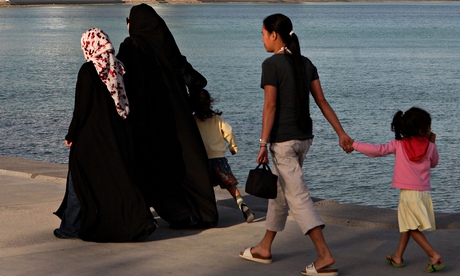- The Guardian, Wednesday 26 February 2014 12.00 EST

Foreign maids, cleaners and other domestic workers are being subjected to slave-like labour conditions in Qatar, with many complaining they have been deprived of passports, wages, days off, holidays and freedom to move jobs, a Guardian investigation can reveal.
Hundreds of Filipino maids have fled to their embassy in recent months because conditions are so harsh. Many complain of physical and sexual abuse, harassment, long periods without pay and the confiscation of mobile phones.
The exploitation raises further concerns about labour practices in Qatar in advance of the World Cup, after Guardian reports about the treatment of construction workers. The maids are not directly connected to Qatar’s preparations for the football tournament, but domestic workers will play a big role in staffing the hotels, stadiums and other infrastructure that will underpin the 2022 tournament.
Our investigation reveals:
• The Philippine Overseas Labour Office (POLO) sheltered more than 600 runaway maids in the first six months of 2013 alone.
• Some workers say they have not been paid for months.
• Many housemaids do not get days off.
• Some contracts and job descriptions are changed once the workers arrive in Qatar.
• Women who report a sexual assault can be charged with illicit relations.
The non-payment of wages, confiscation of documents and inability of workers to leave their employer constitute forced labour under UN rules. According to the International Labour Organisation, forced labour is “all work which is exacted from someone under the menace of any penalty and for which the said person has not offered himself voluntarily”.
Lack of consent can include induced indebtedness and deception about the type and terms of work, withholding or non-payment of wages and the retention of identity documents. Initial consent may be considered irrelevant when deception or fraud has been used to obtain it.
“Menace of penalty” can include physical violence, deprivation of food and shelter, non-payment of wages, the inability to repay a loan, exclusion from future employment and removal of rights and privileges.
Modern-day slavery is estimated to affect up to 21 million people across the globe.
When the Guardian visited in January, at least 35 runaway maids had sought sanctuary at the POLO in the capital, Doha, which provides support to 200,000 Filipinos in Qatar. The welfare officer said most complained of pay being withheld, insufficient food, overwork and maltreatment. Some said they had endured verbal and physical abuse by sponsors of different nationalities.
Eight Filipino workers interviewed by the Guardian said they had not been paid for six months, were sometimes deprived of food while cleaning for long hours and had had their passports confiscated.
“We are afraid,” said 28-year-old Jane*. “We don’t really know what to do. We are trying to survive. That’s why we do part-time jobs secretly.” If they are caught breaching their contract, the maids face months in a deportation centre. The repatriation process is often delayed when people do not have their passports, according to James Lynch, Amnesty International’s researcher on Gulf migrants’ rights.
Qatar vigorously denies it is a “slave state” and is understood to be reviewing the controversial system that governs migrant labour, and to have stepped up inspections of businesses that use migrant labour. The Qatari labour ministry said in a statement: “We have clear laws and contractual terms in place to protect all people who live and work in Qatar and anyone found to have broken those laws will be prosecuted accordingly.” It said that non-payment of wages and confiscation of passports were illegal in Qatar, and added: “The vast majority of workers in Qatar – domestic or otherwise – work amicably, save money and send this home to improve the economic situation of their families and communities in their home countries.”
But the Philippines-based OFW (Overseas Foreign Workers) Watch, which supports Filipino migrant workers, said physical abuse, delayed and refused salaries, the misrepresentation of employers and contracts and passport confiscations were common issues in Qatar. The Guardian has already highlighted this malpractice in its investigation into the mistreatment of migrant workers as Qatar gears up for the 2022 World Cup.
As with the construction workers, the abuse of maids is systemic and brought into sharp focus by a lack of legal protection and the kafala sponsorship system, under which workers cannot leave the country or change jobs without their employer’s permission, Lynch said.
“The women we’ve spoken to who have suffered abuses in the workplace, ranging from excessive working hours to physical violence, their employers came from a variety of countries,” he added.
Many maids say they do not get any rest days and that employers confiscate their mobile phones.
Several recruitment agencies contacted by phone told a Guardian reporter pretending to be a would-be client that they routinely withheld the passports of their migrant workers. One agency volunteered that it was up to the sponsor whether the maid had a day off. “If you want to give an off day, let them rest at your house,” an Al Hadeel Manpower representative said. “Don’t give them free days outside because there is more problems outside.”





























